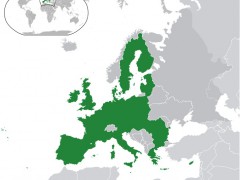The Implications of Economic Liberalization for Egypt
No state in today’s world can escape globalization. The socialist policies adopted by former Egyptian president Nasser in the 1960s might have been suitable for his time. However, the present international system requires the removal of all trade barriers between states.
In Egypt, some intellectuals are criticizing Egypt for taking the route of economic liberalization, ignoring that such route granted Egyptian products free access to the world’s largest unified market; the European Union. The most important agreement handling the liberalization of Egypt’s economic and trade relations is the Egyptian-European Association agreement (AA).
The AA is predominantly an economic agreement whose main aim is the establishment of a free trade area with Egypt. Under the AA, Egypt was granted two key privileges:
- Immediate waiver of all custom duties on its industrial products entering the EU market.
- Immediate waiver of all custom duties on almost all Egyptian agricultural products entering the EU market. However, certain quantitative and seasonal quotas are imposed on certain products. This is basically because the EU aims to protect some of its agricultural products, so it only allows Egypt to export such products on a custom-free basis in limited quantities (quotas) or during certain seasons where the EU’s own production is not sufficient.
In return, Egypt grants the EU:
- A gradual waiver of custom duties on EU industrial products entering Egypt over a period of 15 years to end in 2019. Customs on European raw materials entering Egypt were fully abolished as of 2007, while sophisticated industrial products (cars) will be exempt from customs in 2019.
- A gradual waiver of custom duties on EU agricultural and processed agricultural products over a certain period with limited quotas on some products.
In assessing the importance of the AA, it is crucial to mention that the AA granted all Egyptian industrial and most Egyptian agricultural products free entry to the world’s largest market, serving more than 500 million Europeans within the unified boundaries of the EU 27 member states.
On the other hand, Egypt still benefits from the custom duties imposed on various European industrial and agricultural products entering its market. Those duties constitute a source of revenue for the Egyptian government whilst also providing protection for Egyptian industrial and agricultural products. Additionally, the AA granted Egypt the right to extend the scheduled waiver of customs on European products entering its market for four years, if it perceived imported products to be posing a threat to Egyptian agricultural or industrial products.
Speaking of Egyptian industrial products, it should be mentioned that Egypt still has a long way to go in order to compete with European or Japanese or Chinese industrial products!
In fact, the realization that all European industrial products (including cars) will enter Egypt free of customs in 2019 is a great incentive for Egyptians to improve their own efficiency and produce products of greater quality – which is what competition is all about.
The AA also provides Egypt with technical assistance that will help it to improve its production cycles and get rid of administrative barriers that impede the success of many small and medium-sized projects. In my opinion, technical assistance is no less important than financial assistance as it enhances our capabilities and allows us to create products that are able to compete with Chinese and European ones on the international stage.
The quotas imposed by the EU on some Egyptian agricultural products can indeed be perceived as one of the drawbacks of the AA, at least from the Egyptian viewpoint. However, such a drawback is not as serious as it might seem at first sight when we remember that Egypt is not exporting enough products to fill those quotas. This takes us to our undeniable conclusion:
- For Egypt, it would be more practical to focus on the products it has a comparative advantage in producing, rather than wasting money and efforts and depriving its citizens of high-quality foreign products by producing low-quality products that are not able to compete in the current globalized trade system.
- On the agricultural side, it is necessary for Egypt to work on raising its production rates, which means a greater supply of products domestically coupled with more exports to bring in more revenue.
- Technical assistance should be directed towards improving the quality of products and abolishing bureaucratic barriers hindering innovation in the fields of industry and sustainable development.
- For the EU, the benefit of the AA is mainly political, as it maintains its partnership with a strategic south-Mediterranean country and establishes cultural bridges with its citizens.
- These cultural bridges are the most important thing of all for the EU as they aim to inculcate notions of tolerance and co-existence in the minds of Egyptians, which will decrease risks of terrorism and illegal migration, two of the main threats challenging the EU.
Finally, I believe taking part at similar agreements to the AA would significantly enhance Egypt’s prospects of becoming a truly developed state in economic and industrial terms, decreasing the huge load of government expenditures that are not able to provide Egyptians with efficient services.
Tags: Association Agreement, egypt, EMP, ENP, eu, European Union, free trade, FTA, globalization, international trade, Nasser, Sadat


![Map of the European Union Map of the European Union. By Robert Laymont [CC-BY-SA-3.0] via Wikimedia Commons](http://futurechallenges.org/wp-content/uploads/2013/05/EU.jpg)